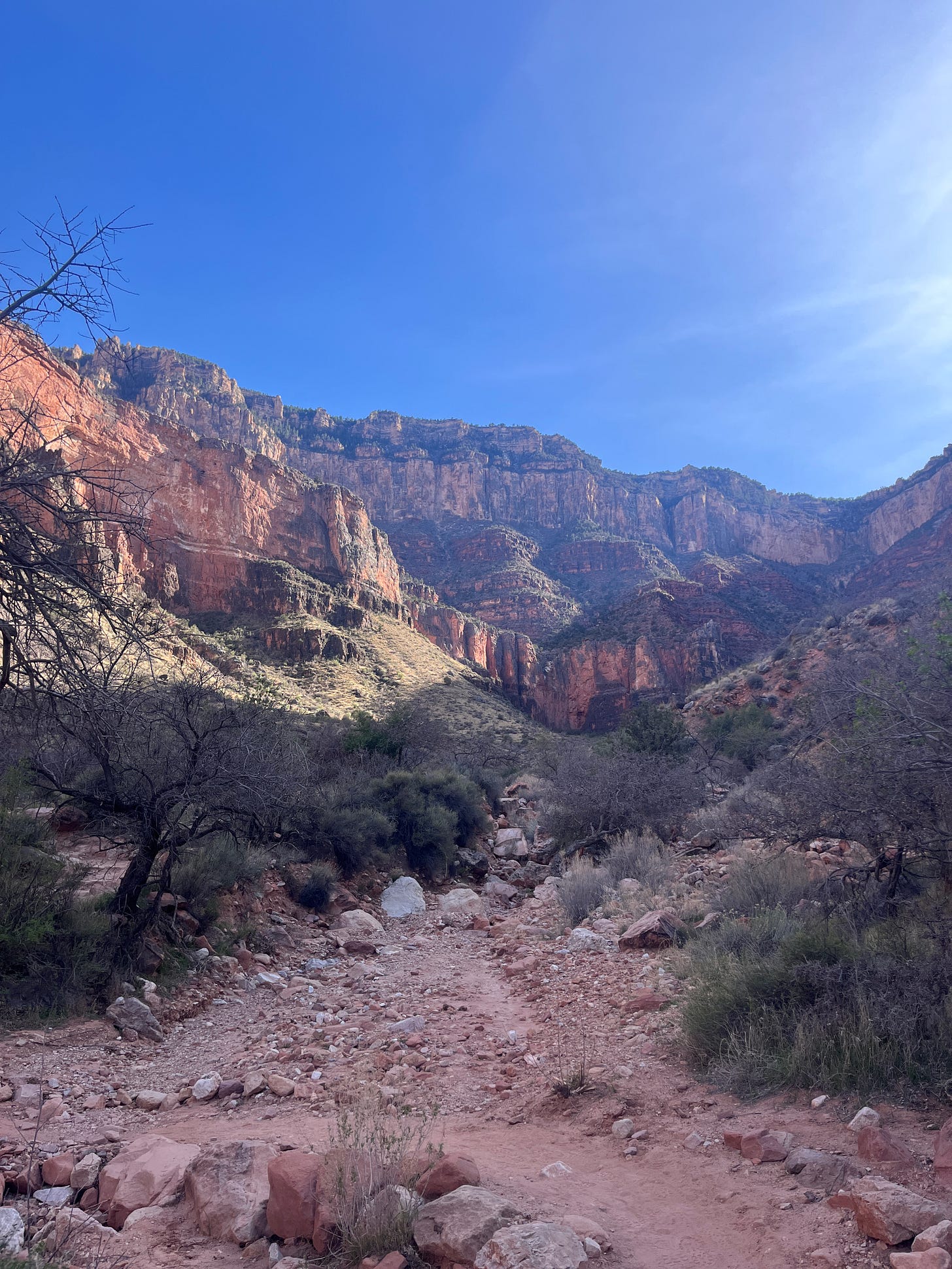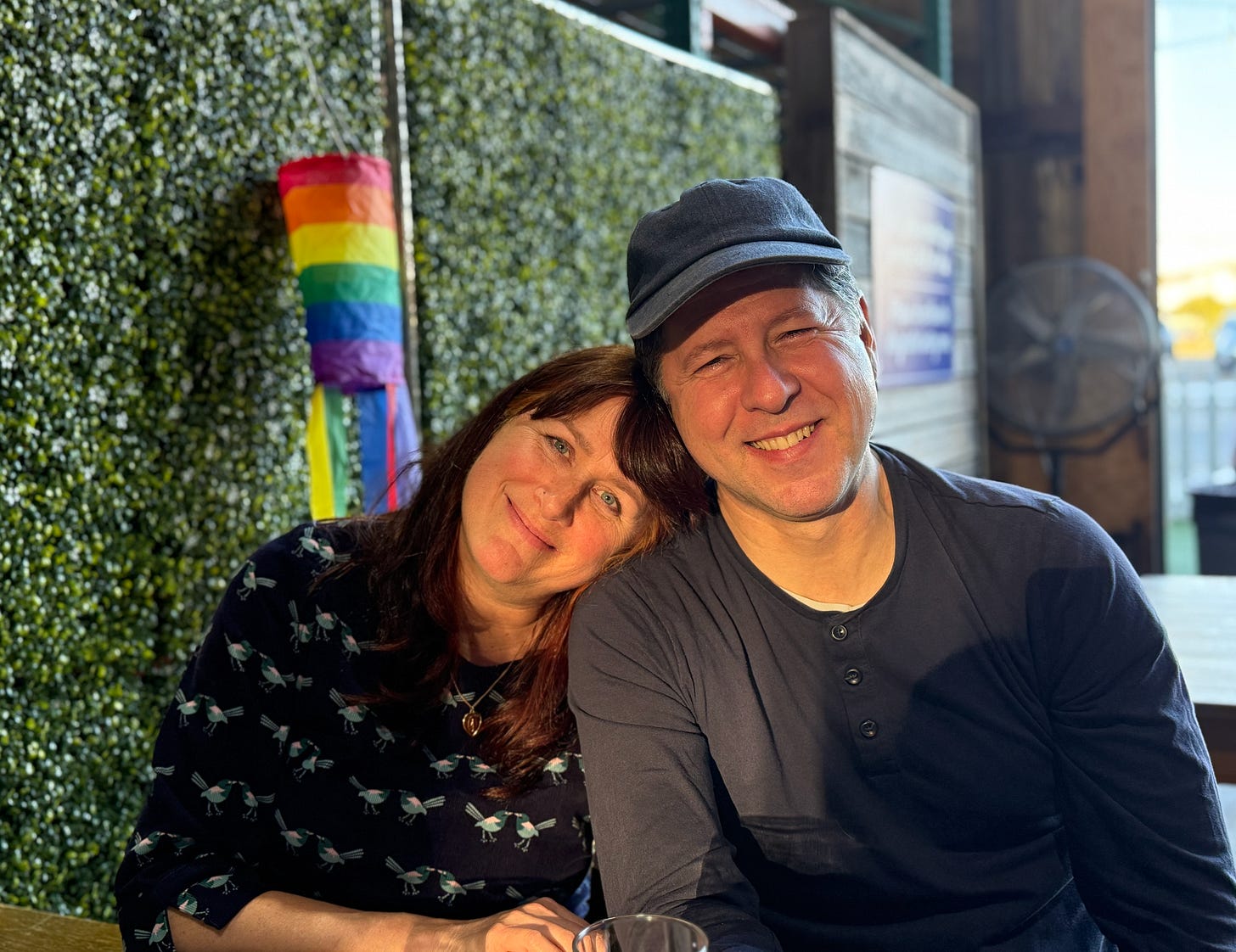“Psalming It by Elizabeth Oldfield” is not a stinky perfume some spokesmodel sprays on you without your permission as you beeline through Macy’s to get to a toy store in the bowels of Ye Olde Mall so you have a present for your nephew’s 7th birthday party because you have now sworn off Amazon.
Psalming It is not a bespoke Olympic sport involving 300-year-ol wooden bats hand-harvested from a linden forest in England, nor is it a cool new competitive bar activity in which Gen Z spits rhymes from Hebrew scriptures for cash prizes.
Psalming It is an easy-as-pie spiritual practice I preached about this past Sunday, my first back in the pulpit since hip replacement surgery. I usually forget my sermons immediately after preaching them, and assume everybody else does, too. I’m not mad about it. It’s a noisy, wordy world, and if my preaching can bring a moment’s comfort, release, or incitement to bravery to a few people, I don’t care if they “remember” it later.
But all week, my husband and I kept bringing up *this* sermon, or rather the spiritual practice it’s named for, invented by author Elizabeth Oldfield. So I thought I’d post an amended version here in our little Substack church, in case you, friends, need a new bulwark against depression and despair.
Meme of a movie theatre marquee that says “It is in your self-interest to find a way to be very tender” pilfered from a friend’s FB page.
Here’s what I preached…
Church, I wish I could tell you that I feel like a little kid again and am ready to do all kinds of things that osteoarthritis has prevented me from for decades, but the reality is, I’ve had a bit of a zigzag recovery. Some days I’m relatively pain free. Others I find myself needing mobility aids like these hiking poles which make me look like a cool 73-year-old rather than a compromised 54-year-old.
Even with everything I’ve learned from many of you about ableism and disability theology, I find myself still learning rudimentary spiritual lessons and struggling to accept for myself the gospel I preach for others:
That God made us to be interdependent, to take turns needing things, and sometimes needing everything
That God made every single body beautiful and blessed, no matter what it can and can’t do
And that I am more than just my beautiful body and its limitations
And finally, that I have value even if I’m not “productive” or “useful”
That last one is a lesson I will have to keep learning until I die, and one that has been especially hard since surgery. I didn’t realize how much I would need to lie around just so my body could heal at a basic level. And to have this extended convalescence take place during the most significant period of collective upheaval in my lifetime pangs even more. I can boycott Amazon or call my members of Congress, but I can’t put my body in the resistance the way I’d like. I’m on a moratorium from getting back in the streets until I can run away from danger.
All that makes me feel impotent, ashamed and sad, which turns into a cocktail of mild despair in my soul, which makes me say terrible things to myself; things like
“What right do you have to feel so down? you’re a privileged white woman with a great support system, and as far as you know you’re only temporarily disabled. Where’s your lauded faith?”
This is, of course, not God’s voice. It’s an imposter, the wounded Ego in Godface. But it still hurts to hear it.
If I listen harder for God, I hear Her say something else, like, “Rest and healing IS your work right now. Let others fly out front. I’ll let you know when and where I want you to take up the hustle again.”
If only it were that easy to just believe God when you hear Their voice and know that voice is telling the truth. But hearing is not always believing, and that’s where practice comes in.
A friend recently turned me on to the writer Elizabeth Oldfield, and her newsletter Fully Alive. In one of her recent entries she talked about a spiritual practice she engages in called “Psalming It.”
She reminds us that the Psalms, 150 songs sacred to both Jewish and Christian people, are a ready-made mobility aid when our spirits are limping. Here are Elizabeth’s own words on the subject:
“The Psalms aren’t all the same, but many of them follow a distinctive pattern.
1. Complaint
2. Lament
3. What else is true?“This structure has taught me that, often, the only way through is down. When I’m feeling overwhelmed (by the state of the world or some site of suffering in my own life) my first instinct is not to Psalm It. The two equally unhealthy places I go are into denial or despair. In denial I am numbing and distracting, seeking to not just manage my exposure to existential issues but avoid them at all costs. This is when I buy face serums. Giant problems are beyond me, so why not focus on a fixable (pseudo-) problem like uneven skin tone? The other state I go to, less often, is binging on terrible news, turning all my attention and focus to the problems out of some misguided belief that worry is effective action. It very quickly degenerates into fatalism and cynicism.
“Psalming It is neither of these. It is a form of emotion processing or regulation which requires us, in that hoary old therapy phrase to ‘feel our feelings.’ There is a mountain of evidence that resisting or repressing negative emotions is a terrible long term strategy, while allowing ourselves to be honest about them reduces stress levels.”
And now I’ll quote Oldfield quoting Tara Westover, who wrote the harrowing book Educated about growing up in an abusive fundamentalist Mormon home,
“Westover, [estranged from her family now as an adult but still processing her grief and trauma], travels to India to stay with the mother of a friend. Westover asks her:
‘How did you keep from breaking?’
There was a tension in [Westover’s] chest. ‘…my question was not about her, I knew that; it was about my own stuckness.’
‘I broke,’ my friend’s mother said. ‘That is how I kept from breaking.’”
Beloved, if you occasionally feel like I have occasionally been feeling: impotent, ashamed, sad, useless, unproductive, rage-filled, or any other feelings that seem like they are permanently squatting on your soul, I want to invite you, too, to break.
Let the music on your most shattering playlist break you.
Let the beauty and courage that is still in the world break you.
Let the sound of your grandchild’s voice on the other end of the phone, telling you about the future, break you.
Let the news break you: innocent young brown men disappeared to a Central American for-profit slave prison; an innocent grad student on her way to a Ramadan feast disappeared into an unmarked car by unmarked men; the Department of Education disappeared and held in an undisclosed location.
Let God’s voice wiping away your shame and impotence break you.
If the thought of breaking terrifies you—if you worry that if you break, you’ll never put the pieces back together again–all I have to say is: is your current strategy working?
‘Breaking’ simply means follow the Psalmist down. Feel everything. Complain. Lament.
Then ask yourself: what else is true?
You may have to rinse and repeat this cycle, daily, hourly.
For me Psalming It goes something like this:
Complaint: “I am tired of hurting.”
Lament: “When will I heal, Lord? When will I feel strong again?”
What else is true? “My convalescence revealed again how many people are willing to care for me. And did some necessary ego-pruning. And helped me work on some internalized ableism.”
A group project version of Psalming It right now might go something like this:
Complaint: why do the wicked prosper?
Lament: everything sucks, God! Where are you?
What else is true? God’s not done with any of this yet, and neither are we.
What makes this photo of the Grand Canyon exciting is that it was taken by my just-turned-19-year-old daughter who has *never done anything like this before* —she hiked rim to rim this week with her bestie, even tho all the bros on the trail scoffed and said they wouldn’t finish. 5k feet of elevation. 23 miles, the last 2 on ice (I’m so glad I didn’t know about the ice—or frankly any of it—till later).
The only way through is down, then back up again. And you can do so much more than the bros believe.
~
Now you try Psalming It!
Complaint:
Lament:
What else is true?
**Post your results in the comments!**
My husband and I practiced this all week. Every time one of us complained, the other said “Now make it bigger and point it at God – turn it into a lament!” and then clinched the arc with a: “Ok, and what else is true?”
TBH, it was annoying as hell, but effective. We didn’t just commit our usual marital osmosis–where one of us dumps their complaint into the other, making both of us feel bad. We challenged each other to move through it by moving down.
Friends don’t let their friends stop at complaint.
Make it bigger.
Point it at God.
Then ask yourself what else is true.
Love you!
Molly
Me and hub, last Sunday afternoon, opting for a pub and games with family instead of a preacher’s nap.








Oh Molly. I needed this. Thank you.
Complaint: fascism, militarism, global conflict is on the rise
Lament: people working for liberation are rightly afraid for their safety, being separated from their families, held in unknown locations. It’s a divisive time that is separating us all and creating fighting between people that would otherwise be struggling together. This makes me sad, fearful and afraid as I wonder what’s ahead for my new baby granddaughter.
What else? Newly tending to existing networks of care in response to division. Finding the holes in the proverbial community cloth and sewing them with relationship, community potlucks, night walks, friendship, in person hang outs, dream work, astrology, prayer, science, love.
Haha. Thank you. That’s a good exercise. 🙏🏻